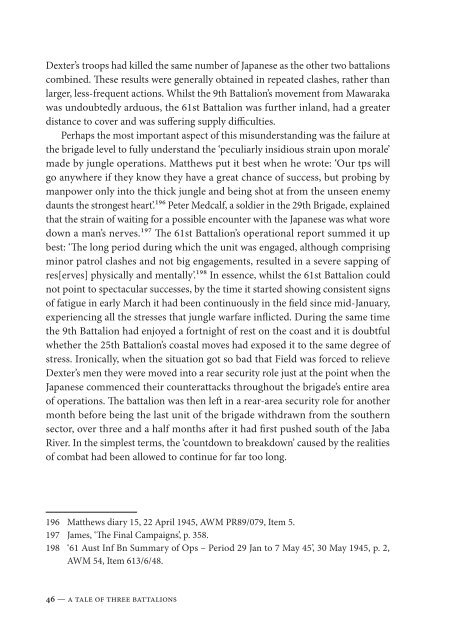View the pdf - Australian Army
View the pdf - Australian Army
View the pdf - Australian Army
Create successful ePaper yourself
Turn your PDF publications into a flip-book with our unique Google optimized e-Paper software.
Dexter’s troops had killed <strong>the</strong> same number of Japanese as <strong>the</strong> o<strong>the</strong>r two battalionscombined. These results were generally obtained in repeated clashes, ra<strong>the</strong>r thanlarger, less-frequent actions. Whilst <strong>the</strong> 9th Battalion’s movement from Mawarakawas undoubtedly arduous, <strong>the</strong> 61st Battalion was fur<strong>the</strong>r inland, had a greaterdistance to cover and was suffering supply difficulties.Perhaps <strong>the</strong> most important aspect of this misunderstanding was <strong>the</strong> failure at<strong>the</strong> brigade level to fully understand <strong>the</strong> ‘peculiarly insidious strain upon morale’made by jungle operations. Mat<strong>the</strong>ws put it best when he wrote: ‘Our tps willgo anywhere if <strong>the</strong>y know <strong>the</strong>y have a great chance of success, but probing bymanpower only into <strong>the</strong> thick jungle and being shot at from <strong>the</strong> unseen enemydaunts <strong>the</strong> strongest heart’.196 Peter Medcalf, a soldier in <strong>the</strong> 29th Brigade, explainedthat <strong>the</strong> strain of waiting for a possible encounter with <strong>the</strong> Japanese was what woredown a man’s nerves.197 The 61st Battalion’s operational report summed it upbest: ‘The long period during which <strong>the</strong> unit was engaged, although comprisingminor patrol clashes and not big engagements, resulted in a severe sapping ofres[erves] physically and mentally’.198 In essence, whilst <strong>the</strong> 61st Battalion couldnot point to spectacular successes, by <strong>the</strong> time it started showing consistent signsof fatigue in early March it had been continuously in <strong>the</strong> field since mid-January,experiencing all <strong>the</strong> stresses that jungle warfare inflicted. During <strong>the</strong> same time<strong>the</strong> 9th Battalion had enjoyed a fortnight of rest on <strong>the</strong> coast and it is doubtfulwhe<strong>the</strong>r <strong>the</strong> 25th Battalion’s coastal moves had exposed it to <strong>the</strong> same degree ofstress. Ironically, when <strong>the</strong> situation got so bad that Field was forced to relieveDexter’s men <strong>the</strong>y were moved into a rear security role just at <strong>the</strong> point when <strong>the</strong>Japanese commenced <strong>the</strong>ir counterattacks throughout <strong>the</strong> brigade’s entire areaof operations. The battalion was <strong>the</strong>n left in a rear-area security role for ano<strong>the</strong>rmonth before being <strong>the</strong> last unit of <strong>the</strong> brigade withdrawn from <strong>the</strong> sou<strong>the</strong>rnsector, over three and a half months after it had first pushed south of <strong>the</strong> JabaRiver. In <strong>the</strong> simplest terms, <strong>the</strong> ‘countdown to breakdown’ caused by <strong>the</strong> realitiesof combat had been allowed to continue for far too long.196 Mat<strong>the</strong>ws diary 15, 22 April 1945, AWM PR89/079, Item 5.197 James, ‘The Final Campaigns’, p. 358.198 ‘61 Aust Inf Bn Summary of Ops – Period 29 Jan to 7 May 45’, 30 May 1945, p. 2,AWM 54, Item 613/6/48.46 — A tale of three battalions
















